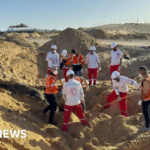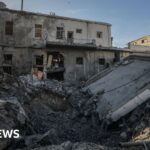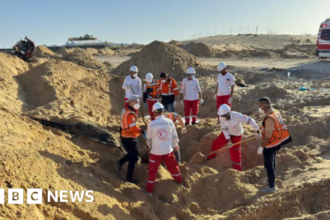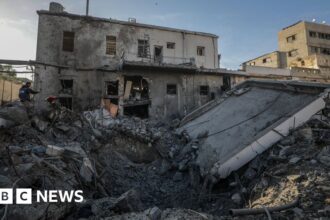**Gaza on Brink of Collapse as Israel’s Military Offensive Continues**
The head of the International Committee of the Red Cross (ICRC), Mirjana Spoljaric, has made a dire warning about the situation in Gaza. In an interview with the BBC, she described the territory as “hell on Earth” due to Israel’s military offensive.
This latest statement comes as the UN Human Rights Office warned that Israel’s tactics are threatening the viability of Palestinians living in Gaza. The ICRC is responsible for enforcing the Geneva Conventions, which provide rules of conduct during war. In this case, they have spoken out publicly because they believe violations are occurring on a massive scale.
**The Humanitarian Crisis Unfolds**
Since March 18, Israeli bombing has killed over 1,500 people in Gaza, according to Hamas’ health ministry. Israel’s Defense Forces have also issued evacuation orders that have forced nearly 400,000 people out of their homes. The entry of all goods, including food and medical supplies, has been blocked by Israel since March 2.
Israel claims it is following international law and that collateral damage is possible due to the nature of the conflict, where Hamas fighters are hidden among civilians. However, Israeli ministers have admitted that there is enough food for the people of Gaza, but this claim is disputed by many experts and aid organizations.
**International Law and the Consequences**
The Geneva Conventions require occupying powers like Israel in Gaza to ensure that civilians have access to medicine, protection for hospitals and health workers, and are fed. They also prohibit the forced transfer of entire populations out of occupied territories. Mirjana Spoljaric stressed that “no state, no party in a conflict…can be exempted from the obligation to not commit war crimes, genocide or ethnic cleansing”.
The ICRC is particularly concerned about the dehumanisation of Palestinians and the relentless pursuit of military objectives at the expense of civilians. All 36 airstrikes confirmed by the UN Human Rights Office were carried out recently, killing women and children.
**International Response**
This latest statement from the ICRC joins a chorus of warnings from other agencies, including the UN and human rights organizations. The UN secretary-general has warned that Israel’s Gaza blockade violates the Geneva Conventions and has made the territory a “killing ground”. The heads of six UN agencies have also called on the world to save Gaza’s people and uphold international law.
**Why the Geneva Conventions Matter**
The Geneva Conventions provide essential rules for protecting civilians in war zones. They require medical staff to be protected, prisoners of war to be treated with humanity, and the warring parties to protect civilians. Despite being outdated by some 20 years ago, the ICRC insists that they apply universally.
Mirjana Spoljaric has called for a renewed ceasefire, pointing out that previous pauses allowed for the successful release of Israeli hostages from Gaza. She also warned about the dangers of abandoning or diluting these rules, saying it sends a message that “anything is permitted”.
**The Lasting Consequences**
As Mirjana Spoljaric said, Gaza will haunt us because we can’t undo the suffering that will last for generations. The Israeli military launched its offensive in response to a cross-border attack on October 7, 2023, where over 1,200 people died and 251 were taken hostage.
The situation is dire, and it’s essential to note that according to Hamas’ health ministry, more than 50,912 Palestinians have died in Gaza since then. The world must act to uphold international law and protect the rights of civilians caught up in this conflict.
**Commentary**
This latest warning from the ICRC highlights the need for a renewed focus on protecting civilians in war zones. As Mirjana Spoljaric stated, it’s not transactional; these rules apply universally, regardless of what the other party does. It’s essential to remember that after the fighting has stopped, soldiers and civilians alike will remember if the other side followed international law or committed atrocities.
**The Next Steps**
As we move forward, it’s crucial to prioritize diplomacy over military action. The ICRC believes adhering to the rules of war will help build a lasting peace. It’s time for world leaders to take notice of this humanitarian crisis and work towards finding a solution that protects the rights of all civilians caught up in this conflict.
**Read More**
For more information, please visit: [www.bbc.com/news/articles/c4g2k4zgvppo](http://www.bbc.com/news/articles/c4g2k4zgvppo)













